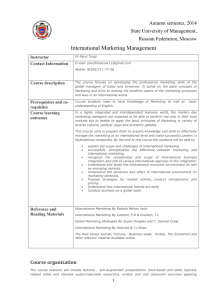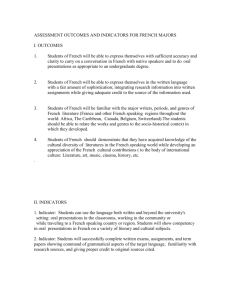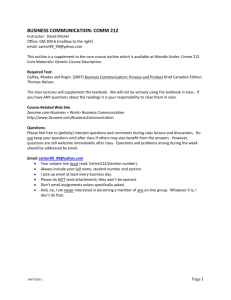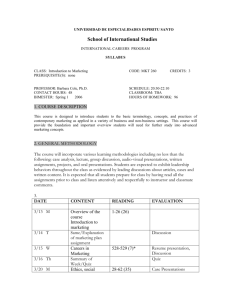MGNT 6670 - The University of West Georgia
advertisement
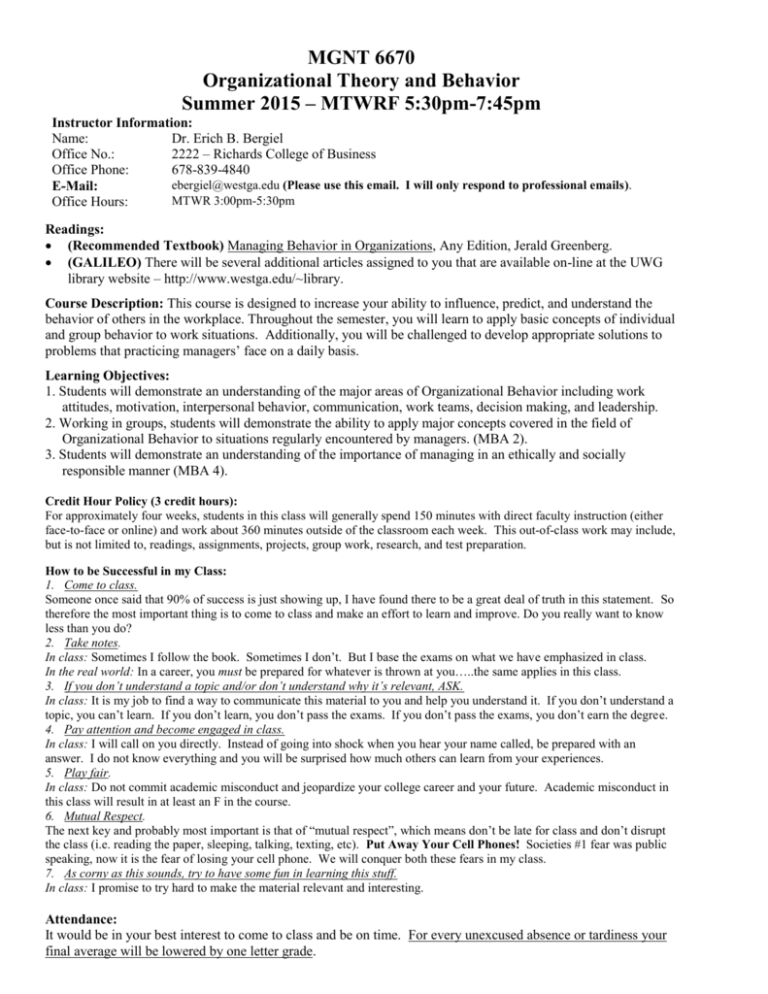
MGNT 6670 Organizational Theory and Behavior Summer 2015 – MTWRF 5:30pm-7:45pm Instructor Information: Name: Dr. Erich B. Bergiel Office No.: 2222 – Richards College of Business Office Phone: 678-839-4840 ebergiel@westga.edu (Please use this email. I will only respond to professional emails). E-Mail: MTWR 3:00pm-5:30pm Office Hours: Readings: (Recommended Textbook) Managing Behavior in Organizations, Any Edition, Jerald Greenberg. (GALILEO) There will be several additional articles assigned to you that are available on-line at the UWG library website – http://www.westga.edu/~library. Course Description: This course is designed to increase your ability to influence, predict, and understand the behavior of others in the workplace. Throughout the semester, you will learn to apply basic concepts of individual and group behavior to work situations. Additionally, you will be challenged to develop appropriate solutions to problems that practicing managers’ face on a daily basis. Learning Objectives: 1. Students will demonstrate an understanding of the major areas of Organizational Behavior including work attitudes, motivation, interpersonal behavior, communication, work teams, decision making, and leadership. 2. Working in groups, students will demonstrate the ability to apply major concepts covered in the field of Organizational Behavior to situations regularly encountered by managers. (MBA 2). 3. Students will demonstrate an understanding of the importance of managing in an ethically and socially responsible manner (MBA 4). Credit Hour Policy (3 credit hours): For approximately four weeks, students in this class will generally spend 150 minutes with direct faculty instruction (either face-to-face or online) and work about 360 minutes outside of the classroom each week. This out-of-class work may include, but is not limited to, readings, assignments, projects, group work, research, and test preparation. How to be Successful in my Class: 1. Come to class. Someone once said that 90% of success is just showing up, I have found there to be a great deal of truth in this statement. So therefore the most important thing is to come to class and make an effort to learn and improve. Do you really want to know less than you do? 2. Take notes. In class: Sometimes I follow the book. Sometimes I don’t. But I base the exams on what we have emphasized in class. In the real world: In a career, you must be prepared for whatever is thrown at you…..the same applies in this class. 3. If you don’t understand a topic and/or don’t understand why it’s relevant, ASK. In class: It is my job to find a way to communicate this material to you and help you understand it. If you don’t understand a topic, you can’t learn. If you don’t learn, you don’t pass the exams. If you don’t pass the exams, you don’t earn the degree. 4. Pay attention and become engaged in class. In class: I will call on you directly. Instead of going into shock when you hear your name called, be prepared with an answer. I do not know everything and you will be surprised how much others can learn from your experiences. 5. Play fair. In class: Do not commit academic misconduct and jeopardize your college career and your future. Academic misconduct in this class will result in at least an F in the course. 6. Mutual Respect. The next key and probably most important is that of “mutual respect”, which means don’t be late for class and don’t disrupt the class (i.e. reading the paper, sleeping, talking, texting, etc). Put Away Your Cell Phones! Societies #1 fear was public speaking, now it is the fear of losing your cell phone. We will conquer both these fears in my class. 7. As corny as this sounds, try to have some fun in learning this stuff. In class: I promise to try hard to make the material relevant and interesting. Attendance: It would be in your best interest to come to class and be on time. For every unexcused absence or tardiness your final average will be lowered by one letter grade. Exams: We will have two exams this semester. Each exam will consist of questions taken from class lectures, assigned readings, cases, and group presentations. The specific test format will be announced prior to each exam. Generally, make-up exams will not be given. Consideration for rescheduling an exam will be given only if you notify the instructor at the earliest possible time and if you can present appropriate documentation regarding your absence. Individual Assignments: Article Review: Each student will write a review and evaluation of a journal article related to topics discussed in class. The report should be between two and three pages. The report must be typed, single spaced, have a 12-point font, have 1” margins, and have headings and subheadings where necessary. Please note that I expect your written report to be free of misspellings, grammar errors, and ambiguous statements. The article chosen must be approved by the instructor. Further guidance can be found on Courseden. Article Presentations: Each student will present the article they choose for their article review. The article must be approved in advance so two students will not present the same article. Students will be selected at random for the business presentations in class. The presentation will last no less than 4 minutes and no more than 5 minutes and the presenter will use presentation software other than PowerPoint (e.g. Prezi, etc.). The presentation will be followed by questions from fellow students and the professor. The presentation should be very professional. You should not read from note cards or slides and be prepared to improvise and adapt. Before the presentation the student must provide a coversheet with the students name and the name of the title of the article chosen as well as the Rubric found on Courseden. Group Assignments: One of the three major levels at which Organizational Behavior is studied is at the group level. Thus, to increase your understanding of work group dynamics, you will be required to work in designated groups. If it is felt that one of the members of the group is not contributing a recommendation for termination can be brought to me and this member will be fired from the team (I am the only one that can make the final decision to fire any team member). Those members that are fired from the team will then complete all assignments individually. The group assignments are explained below. Group Presentation: Each group will choose a topic to discuss and present to the class. The topic should be introduced, defined, and then explained. For the explanation portion of the presentation you will use three of the following sources for your topic: o An article from a reputable academic journal. o A personal example (e.g. work example, personal interaction, experience etc.) o A movie clip or a commercial o A real world example (e.g. news article, book, etc.) The presentation will last no less than 10 minutes and no more than 13 minutes and the presenter will use presentation software other than PowerPoint (e.g. Prezi, etc.). The presentation will be followed by questions from fellow students and the professor. Before the presentation the group must provide a coversheet with the students’ names and the topics chosen. Topic subjects are listed below: o Chaos/System Theory, Organizational Justice, Ethics, Social Responsibility, Personality, Attitudes, Perception, Personality (any trait), Equity Theory, Job Satisfaction, Organizational Commitment, Motivational Theory Discussed, Leadership Theory Discussed, One of Hofestedes Dimensions, Expectancy Theory, Charismatic Leadership, Group Theories Discussed, Shared Mental Models, Communication, Decision Making Theories Discussed (ask me if there is a topic of interest not mentioned) Outside research is highly encouraged and the presentation should be very professional. You should not read from note cards or slides and be prepared to improvise and adapt. Reading Assignments: Your reading assignments are provided in the tentative course outline in this syllabus or will be provided the first day of class. Because of the interactive and applied nature of this course, we may not be able to cover all of the material in the assigned readings. Thus, it is your responsibility to carefully read and study each assignment. Courseden: You will find Courseden helpful in this class. Many of the PowerPoint overheads used in class are posted here as well as your exam grades. Also, if you lose your syllabus, a copy is posted for your convenience. Grades: Your final grade will be determined as follows: Test 1 Test 2 Group Assignment Presentation Article Review Article Presentation Participation Total 100 points 100 points 50 points 50 points 30 points 20 points 350 points Scale: A B C F (90-100) (80-89) (70-79) (0-69) Student Rights and Responsibilities: Please carefully review the information at the following link: http://www.westga.edu/assetsDept/vpaa/Common_Language_for_Course_Syllabi.pdf The document at this link contains important information pertaining to your rights and responsibilities in this class. Because these statements are updated as federal, state, university, and accreditation standards change, you should review the information each semester TENTATIVE COURSE OUTLINE AND ASSIGNMENTS DATE 7/1 7/2 TOPIC What Is Organizational Behavior and Why Does It Matter? Systems Theory and Chaos Theory Organizational Justice, Ethics, and Corporate Social Responsibility ASSIGNMENT Chapter 1 Read Articles Assigned 1 page Bio due at beginning of class. One side, single space, 12pt Times New Roman. Just name and date on top. Chapter 2 Read Articles Assigned Chapter 3 Read Articles Assigned 7/4 Psychological Processes in Organizations: Personality, Perception, and Learning Influence of Culture Coping with Organizational Life: Emotions and Stress 7/5 Influence of Culture Chapter 4 Article on Work Stress Online Class 7/8 Observation Experiment Online Assignment 7/9 7/10 Work on Team Project/Article Review Work-Related Attitudes: Prejudice, Job Satisfaction, and Organizational Commitment What Motivates People to Work? Out of Class Assignment Chapter 5 Read Articles Assigned Chapter 6 Read Articles Assigned No Class Meeting Chapter 7 7/3 7/11 7/12 7/15 7/16 7/17 7/18 Article Review Due Interpersonal Behavior in the Workplace 5 Article Review Presentations Due Organizational Communication 5 Article Review Presentations Due Test 1- Chapters 1-8 Group Processes and Work Teams 5 Article Review Presentations Due 7/19 7/22 10 Article Review Presentations Due Making Decisions in Organizations 5 Article Review Presentations 7/23 7/25 The Quest for Leadership 5 Article Presentations Group Assignment Presentation Test 2 Chapters 6-11 Chapter 8 Chapter 9 Read Articles Assigned Chapter 10 Read Articles Assigned Chapter 11 Read Articles Assigned
